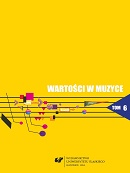O pożytkach płynących z obecności jazzu w kulturze polskiej
About Benefits of Jazz Music in Polish Culture
Author(s): Rafał CiesielskiSubject(s): Music
Published by: Wydawnictwo Uniwersytetu Śląskiego
Keywords: Polish jazz; understanding music; improvisation; music education; Polish musical idiom
Summary/Abstract: In Polish music culture, jazz has been a long-lasting phenomenon, having its defined place in it, its ways and forms of activity, and strong position, as well as considerable artistic achievements. As such, jazz may be an important source of inspiration and mark ist presence in various spheres of culture. In the present article three such spheres have been discussed. One of them is the sphere of understanding music. In the light of heteronomous option dominating in contemporary culture and in the context of reading past, present and future music compositions, restitution of aesthetic-musical category of autonomy would be desireable. Since activities consolidating heteronomous option and ignoring autonomic one dominate in mass culture and general education, the role of jazz may be significant. For this is the music which, having utilitarian origins and becoming an artistic creation, has established and retained the status of autonomic art form. Another sphere leads one towards performative perspective. The basic element of jazz — improvisation — could be used here. Absence of this element in music education, in each case, closes access to certain areas of individual activity, artistic research and development of the musician. Today, improvisation seems impossible to be retained as a systemic feature of music education. The requirements with regard to musical performance are constantly being expanded. They cannot be limited to narrow technical-interpretative competences, but they should comprise elements that facilitate the development of a creative and conscious artist. Improvisation in music education is applied at four levels: 1. connected with the characteristics of the musician himself/herself perceived as a creative individual, together with the factors that shape his/her artistic personality and individual condition, 2. referring to the performance of Early Music, 3. referring to the performance of folk music and 4. referring to the performance of contemporary music. Jazz, in turn, may become one of the fields establishing the idiom of Polish music. Here, only two of its aspects, already visible in Polish jazz, can be indicated: the use of Polish folk music and inspirations with the music of Fryderyk Chopin. Polish jazz, reaching back to Polish folk music and Chopin’s compositions, defines its position in Polish music culture in a specific way. Using various elements from both fields, it acquires characteristic and original features that concentrate on the category of Polishness. Regarding locality of these inspirations, the above-enumerated features will always remain unique, unambiguous signum of cultural identification and affinity to Polish jazz. Owing to references to Chopin and Polish folk music, jazz has emerged as a field oriented towards Polish musical tradition which, basing on its own jazz stylistics, may be inscribed in Polish musical idiom sensu largo.
Journal: Wartości w muzyce
- Issue Year: 2014
- Issue No: 6
- Page Range: 85-101
- Page Count: 17
- Language: Polish

